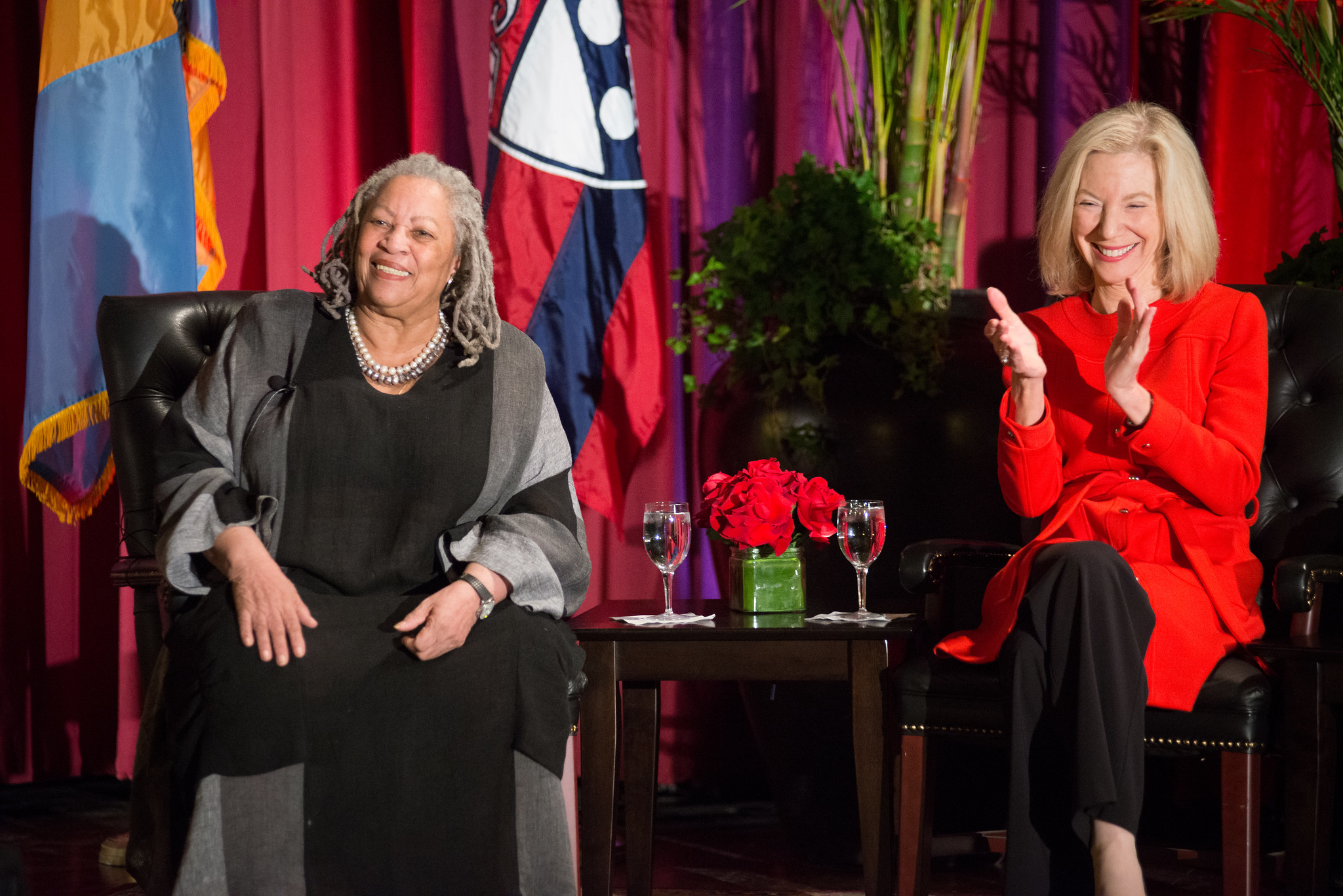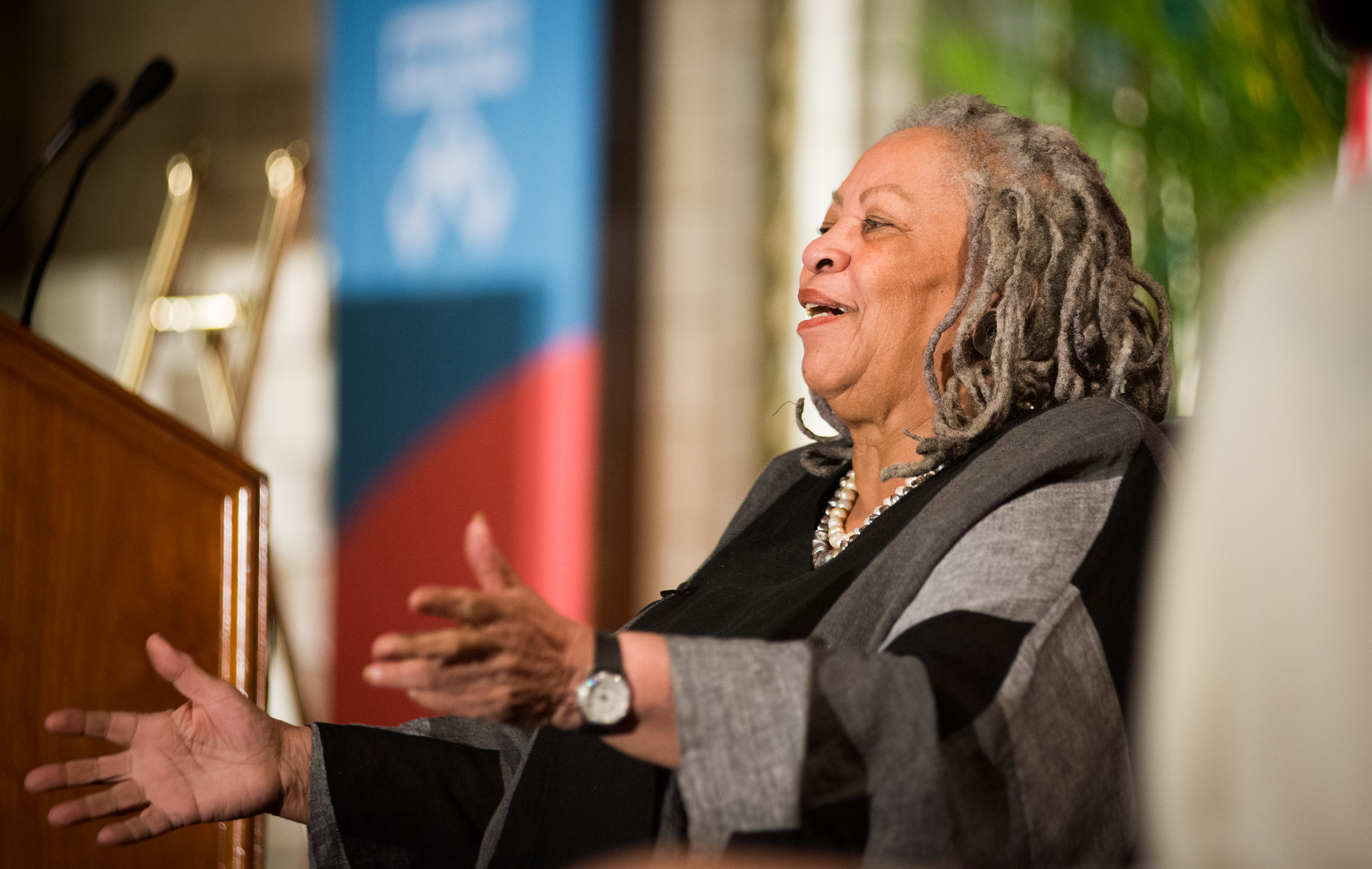
As the world grieves the loss of a Pulitzer-winning literary giant, the first black woman to receive the Nobel Prize in Literature, recipient of the Presidential Medal of Freedom, and a life-changing mentor to many, the Penn community remembers and celebrates the legacy of Toni Morrison.
Awarded an honorary degree from the University of Pennsylvania in 1988, Morrison also received the prestigious Beacon Award from the Trustees’ Council of Penn Women in 2012 and was a featured speaker at the 2004 presidential inauguration of her colleague and friend, University of Pennsylvania President Amy Gutmann.
“Toni was among the most magnificent, courageous writers and extraordinary women of our time, and certainly one of the greatest people I have ever known,” says Gutmann. “She was fiercely devoted to friends, and her greatest joy was her family. I am unbelievably fortunate to have learned from such a remarkable colleague and blessed to have been among her friends.”
Gutmann and Morrison were fellow faculty members at Princeton University, and their ties remained close during Gutmann’s presidency at Penn. In addition to Gutmann’s inauguration and the presentation of the Beacon Award, Morrison was the guest of honor at a 75th birthday party thrown by Gutmann after the Philadelphia premiere of the opera “Margaret Garner,” the libretto of which Morrison authored. The two shared the stage at several events through the years, including the 2000 celebration of the 10th anniversary of the University Center for Human Values (UCHV) at Princeton, of which Gutmann was the founding director.
“The same gifts Toni brought to the page, she lent to the podium,” Gutmann recalls. “When she joined me in speaking at the UCHV anniversary symposium, she meditated on the place of values in academia. ‘The search for goodness,’ she said, ‘is part of the justifying, legitimizing language of the academy.’ Exactly the right words delivered in a way all her own—that was Toni. And I always took her words to heart.”
Joann Mitchell, senior vice president for institutional affairs and chief diversity officer, has many cherished memories of Morrison, whom she met shortly before Morrison was awarded the Nobel Prize in 1993. Mitchell describes Morrison as emblematic of the values instantiated in the Penn Compact.
“She was inclusive and lent her support to those she believed were promising or talented in a wide array of fields; one of her many innovations was the Princeton Atelier that allowed students to learn from and create with gifted artists from a variety of disciplines; and she looked for ways to be impactful and encouraged others to do likewise,” Mitchell says. “She urged us to have the courage of our convictions and to speak up and speak out with integrity, candor, and courage.”
Herman Beavers, professor of English and Africana Studies, writes about Morrison’s work, teaches the course “Toni Morrison and the Adventure of the 21st Century,” and is a longtime member of the Toni Morrison Society, where he is also a member of the advisory board. He first met Morrison while in college.
“Two seconds in her presence and you’re tremendously aware that this is a person of enormous intellectual gravitas and personal presence,” he remembers of first meeting her. “Toni Morrison brings out the best in a person. She struck me as a force of nature.”
He recalls the English department of his own graduate school shied away from teaching African American writers at the time, so when he found Toni Morrison’s work, he was enamored. “She is so incredibly layered that reading her is always rewarding,” he says.
“The legacy I think she leaves for academia is one that, on a very basic level, we have to tell the truth. We have to tell the truth to students about their work. To tell the truth about the way we approach material and attempt to guide students, and tell the truth about what this country is. And when we don’t, we pay a price for that.”
Gwendolyn DuBois Shaw, associate professor of history of art, also reflects on Morrison’s legacy in academia. Shaw says Morrison will of course be remembered for lifting up African American and women scholars and leaders, as well as bringing vital new voices to issues of race in the United States. Morrison will also stand tall as a leading and groundbreaking critic. Shaw particularly admires the essay collection “Playing in the Dark: Whiteness and the Literary Imagination” that reappraises the works of classic authors like Ernest Hemingway and Herman Melville.
“It’s such a brief and yet such a valuable document,” Shaw says. “I’ve been looking at posts from colleagues and universities, and people praise [Morrison’s] novels, but the critical work is one of the things I think will stick with so many of us—that there is this potential to go back and look at works that people had critiqued hundreds of times, and that there are always possibilities for original thought, for original contributions. If you choose to open your eyes and see in the ways she did.”
On April 12, 2012, the Trustees’ Council of Penn Women, President Gutmann, and the Penn community gathered in Harrison Auditorium at the Penn Museum to award Toni Morrison the coveted Beacon Award. Before presenting the award, Gutmann celebrated Morrison’s many achievements and contributions.
“You have enriched our world through your literature, vividly bringing to life cherished characters, dark secrets, and powerful images of hope,” Gutmann said. “Your courage has inspired, challenged, and taught us all. Your talent and vision know no bounds. You shine in fiction, in non-fiction, writing for people of all ages, as a playwright, and as an editor. In your teaching, you set new rules. In all that you do, you blaze new trails. You inspire women worldwide. Your impact and influence continue to grow.”








